Seduction of the Minotaur Read online
Page 6
Another time he had said: “I’m fully aware, of course, that you’ve thrown me off the scent by involving me in the secret lives of all your friends in place of your own. But I will tell you one shocking truth. It’s not the sun you’re basking in, it’s my people’s passivity and fatalism. They believe the character of man cannot be altered or tampered with, that man is nature, unpredictable, uncontrollable. They believe whatever he is should be accepted along with poverty, illness, death. The concept of effort and change is unknown. You are born poor, good or bad, or a genius, and you live with that just as you live with your relatives.”
“Do people ever run amok in Golconda? As they do in Bali or Africa, or the South Sea Islands?”
“Yes, they do. Because having based all their lives on resignation, acceptance, humility, passivity, when they find them selves in a trap, they do not know how to defeat it; they only know how to grab a revolver or a knife and kill.”
“No one searches for reasons, no one prods?”
“Except me. And I will be punished for it. Whoever tampers with this empathy with animals, this osmosis with light, this absence of thought, is always made the victim of people’s hatred of awareness.”
“You have anesthetics for physical pain. Why not for anxiety, then?”
“Because they do not care.”
There was a masquerade dance on the Mexican general’s yacht.
From its decks fireworks exploded into the bay, and the rowboats which took the guests up to the ladder had to sail courageously through a shower of comet tails.
The Mexican general was the only one who was not disguised. He awaited his guests at the top of the ladder, greeted them with an embrace; his circumference was so wide that all Lillian was able to kiss in response to his embrace was one of the medals on his chest.
From behind masks, feathers, paint, spangles, all Lillian could see at first were eyes, sea-eyes, animal-eyes, earth-eyes, eyes of precious stones. Fixed, mobile, fluid, some were easily caught by a stare, others escaped all but a fleeting spark.
Lillian recognized the Doctor only when he spoke. He was costumed as an Aztec warrior, face and body painted, and he was carrying a sharp-pointed lance, with sharp arrows slung across his ck. It was his turn to inflict deep wounds, like those he was weary of healing. That night his appearance forbade all women to rest their heads upon his shoulder and confess their difficulties. Before they crumpled into wailing children, he would challenge the potential mistress.
When Diana arrived with Christmas walking in her shadow, the Doctor said: “When patients suffer from malnutrition of the senses, I send them to Diana.”
Diana, her head emerging from the empty picture frame, wearing a violet face mask and her hair covered with sea weed, was dancing with Christmas.
Christmas was dressed quite fittingly, as a man from another planet, but such affirmation of distance did not discourage Diana. She kissed him, and the frame fell around both their shoulders like a life belt to keep them afloat on the unfamiliar sea of the senses, its swell heightened by the jazz and the fireworks.
A couple was leaning over the railing, and Lillian could hear the woman say: “Even if you don’t mean it, just for tonight, say you love me. I won’t ever remind you of it; I will not see you again, but just for tonight say you love me, say you love me.”
Would such a guarantee of freedom from responsibility make of any man a lover and a poet? Bring about a lyrical confession? In the green flare of a fireworks fountain, Lillian saw that the man hesitated to create illusion even for one night, and she thought, “He should have been disguised as the greatest of all misers!”
The woman in quest of illusion disappeared among the dancers.
Everyone was already dancing the intricate patterns of the mambo, which not only set bodies in motion but generated words which would not have been said without such propulsions.
The Doctor was transformed by his disguise; Lillian was astonished to watch him in the role of ruthless lover who would deal only in wounds in the war of love, none of the consolations. He had separated Diana from Christmas with some ironic remarks, and caused another woman to sit alone among the cordage piled in circles on the deck like sleeping anacondas.
It was not only the champagne Lillian drank, it was the softness of the night so palpable that when she opened her mouth she felt as if she had swallowed some of it: it descended into her arteries like a new drug not yet discovered by the alchemists. She swallowed the softness, and then swallowed the showers of light from the fireworks too, and felt illumined by them. It was not only the champagne, but the merry cries of the native boys diving for silver pieces around the yacht, and then climbing on the anchor chain to watch the festivities.
There were many Golcondas—one above the horizon, dark hills wearing necklaces of shivering lights, one reflected on the satin-surfaced bay, one of oil lamps from the native huts, one of candlelights, one of cold neon lights, the neon cross on the church, the neon eyes of the future, without warmth at all—but all of them looked equally beautiful when their reflections fell into the water.
Doctor Hernandez was dancing with a woman who reminded n of Man Ray’s painting of a mouth: a giant mouth that took up all of the canvas. The young man the woman had discarded in order to dance with the Doctor seemed disoriented. Lillian noticed his pallor. Drunkenness? Sorrow? Jealousy? Loneliness?
She said to him: “Do you remember in all the Coney Islands of the world a slippery turntable on which we all tried to sit? As it turned more swiftly people could no longer hold onto the highly waxed surface and they slid off.”
“The secret is to spit on your hands.”
“Then let’s both spit on our hands right now,” she said, and the manner in which he compressed his mouth made her fear he would be angry. “We both slipped off at the same moment.”
His smile was so forced that it came as a grimace. The cries of the diving boys, the narcotic lights, the carnival of fireworks and dancing feet, no longer reached them, and they recognized the similarity of their mood.
“Every now and then, at a party, in the middle of living, I get this feeling that I have slipped off,” she said, “that I am becalmed, that I have struck a snag… I don’t know how to put it.”
“I have that feeling all the time, not now and then. How would you like to escape altogether? I have a beautiful house in an ancient city, only four hours from here. My name is Michael Lomax. I know your name, I have heard you play.”
In the jeep she fell asleep. She dreamed of a native guide with a brown naked torso, who stood at the entrance to an Aztec tomb. Holding a machete, he said: “Would you like to visit the tomb?”
She was about to refuse his invitation when she awakened because the jeep was acting like a camel on the rough road. She heard the hissing of the sea.
“How old are you, Michael?”
He laughed at this: “I’m twenty-nine and you’re about thirty, so you need not use such a protective tone.”
“Adolescence is like cactus,” she said, and fell asleep again.
And she began dreaming of a Chirico painting: endless vistas of ruined columns and ghostly figures either too large, like ancient Greek statues, or too small as they sometimes appeared in dreams.
But she was not dreaming. She was awake and driving at dawn through the cobblestones of an ancient city.
Not a single house complete. The ruins of a once sumptuous baroque architecture, still buried in the silence it had been in since the volcano had erupted and half buried it in ashes and lava.
The immobility of the people, the absence of wind, gave it a static quality.
The Indians lived behind the scarred walls quietly, like mourners of an ancient splendor. The lie of each family took place in an inner patio, and, as they kept the shutters closed on the street side, the city had the deserted aspect of a ghost town.
Rows of columns no longer supporting roofs, churches open to a vaulted sky, a coliseum’s empty seats watching in the
arena the spectacle of mutilated statues toppled by the victorious lava. A convent without doors, the nun’s cells, prisons, secret stairways exposed.
“Here is my house,” said Michael. “It was once a convent attached to the church. The church, by the way, is an historic monument, what’s left of it.”
They crossed the inner patio with its music of fountains and entered a high-ceilinged white stucco room. Dark wood beams, blood-red curtains, and wrought-iron grilles on the windows gave the dramatic contrasts which are the essence of Spanish life, a conflict between austerity and passion, poetry and discipline. The high walls gave purity and elevation, the rich, voluptuous, red primitive ardor; dark wood gave the somber nobilities; the iron grilles symbolized the separation from the world which made individuality grow intensely as it did not grow when all barriers of quality and evaluations were removed.
The church bells tolled persistently although there was no ritual to be attended, as if calling day and night to the natives buried by the volcano’s eruption years before.
Walking through the muted streets of the place with Michael, Lillian wondered how the Spaniards and the Mayans now lived quietly welded, with no sign of their past warring visible to the outsider. Whatever opposition remained was so subtle and indirect that neither Spaniards nor visitors were aware of it. Michael repeated many times: “The Indians are the most stubborn people.”
In the dark, slumbering eyes, white people could never find a flicker of approbation. The Indians expressed no open hostility, merely silence whenever white people approached them, and their glazed obsidian eyes had the power of reflecting without revelation of feelings, as if they had themselves become their black lacquered pottery. White people would explain how they wanted a meal cooked, a house built, a dress made. In the Indian eyes there was a complete lack of adhesion, in their smiles a subtle mockery of the freakish ways of all visitors, ancient or modern. The Indians would work for these visitors, but disregard their eccentricity and disobey them with what appeared to be ignorance or lack of understanding, but which was in reality an enormous passive resistance to change, which enabled them to preserve their way of life against all outside influences.
The Catholic church bells continued to toll, but in the eyes of the Indians this was merely another external form to be adopted and mysteriously, indefinably mocked. On feast days they mixed totem poles and saint’s statues, Catholic incense and Indian perfumes, the Catholic wafer and Mayan magic foods. They enjoyed the chanting, the organ and candlelight, the lace and brocades; they played with pictures of the saints and at the same time with Indian bone necklaces.
The silence of the ancient city was so noticeable and palpable that it disturbed Lillian. She did not know at first what caused it. It hung over her head like suspense itself, as menacing as the unfamiliar noises in the jungle she had crossed on the way.
She wondered what attracted Michael to living here among ruins. It was a city rendered into poetry by its recession into the past, as cities are rendered into poetry by the painters because of the elements left out, allowing each spectator to fill in the spaces for himself. The missing elements of the half-empty canvas were important because they were the only spaces in which human imagination could draw its own inferences, its own architecture from its private myths, its streets and personages from a private world.
A city in ruins, as this ancient city was, was more powerful and evocative because it had to be constructed anew by each person, therefore enhanced into illimitable beauty, never destroyed or obscured by the realism of the present, never rendered familiar and forced to expose its flaws.
To gain such altitude it was necessary to learn from the artist how to overlook, leave out, the details which weighed down the imagination and caused crash landings.
Even the prisons, where one knew that scenes of horror had taken place, acquired in the sun, under streams of ivy gently bleached by time, a serenity, a passivity, a transmutation into resignation which included forgiveness of man’s crimes against man. In time man will forgive even the utmost cruelty merely because the sacred personal value of each man is lost when the father, the mother, son or daughter, brother or sister, wife of this man have ceased to exist—the ones who gave his life its importance, its irreplaceable quality. Time, powerless to love one man, promptly effaces him. His sorrows, torments, and death recede into impersonal history, or evaporate into these poetic moments which the tourists come to seek, sitting on broken columns, or focusing their cameras on empty ransacked tombs, none of them knowing they are learning among ruins and echoes to devaluate the importance of one man, and to prepare themselves for their own disappearance.
The ancient city gave Lillian a constriction of the heart. She was not given to such journeys into the past. To her it seemed like a city mourning its dead, even though it could not remember those it mourned. She saw it as the ruins of Chirico’s paintings and asked Michael: “But why the heavy silence?”
“There’s no wind here,” said Michael.
It was true. The windlessness gave it the static beauty of a painting.
But there was another reason for the silence, which she discovered only in the afternoon. She was taking a sunbath on the terrace, alone.
The sun was so penetrating that it drugged her. She fell asleep and had a dream. A large vulture was flying above the terrace, circling over her, and then it swooped downward and she felt its beak on her shoulder. She awakened screaming, sat up, and saw that she had not been dreaming, for a vulture had marked her shoulder and was flying away slowly, heavily.
Wherever vultures settled they killed the singing birds. The absence of singing birds, as well as of the wind, was the cause of that petrified silence.
She began to dislike the ancient city. The volcano began its menacing upward sweep as neat as the edge of the city, and rose so steeply and so high that its tip was hidden in the clouds. “I have been up there,” said Michael. “I looked down into its gaping top and saw the earth’s insides moldering.”
Michael said on Sunday: “I wish you would spend all your free days here, every week.”
That evening he and Lillian, and other guests, were sitting in the patio when suddenly there appeared in the sky what seemed at first like a flying comet, which then burst high in the air into a shower of sparks and detonations.
Lillian thought: “It’s the volcano!”
They ran to the outside windows. A crowd of young men, carefully dressed in dark suits and gleaming white shirts, stood talking and laughing. Fireworks illuminated their dark, smooth faces. The marimbas played like a concert of children’s pianos, small light notes so gay that they seemed the laughter of the instrument.
The fireworks were built in the shape of tall trees, and designed to go off in tiers, branch by branch. From the tips of the gold and red branches hung planets, flowers, wheels gyrating and then igniting, all propelled into space bursting, splintering, falling as if the sun and the moon and the stars themselves had been pierced open and had spilled their jewels of lights, particles of delight.
Some of the flowers spilled their pollen of gold, the planets flew into space, discarding ashes, the skeletons of their bodies. But some of the chariot wheels, gyrating wildly, spurred by each explosion of their gold spokes, wheeled themselves into space and never returned in any form, whether gold showers or ashes.
When the sparkles fell like a rain of gold, the children rushed to place themselves under them, as if the bath of gold would transform their ragged clothes and lives into light.
Beside Lillian, Michael took no pleasure in the spectacle. She saw him watching the students with an expression which had the cold glitter of hunger, not emotion. Almost the cold glitter of the hunter taking aim before killing.
“This is a fiesta for men only, Lillian. The men here love each other openly. See, there, they are holding hands.”
Lillian translated this into: He wants it to be thus, this is the way he wants it to be.
“They like to be al
one, among men. They enjoy being without women.” He looked at her this time with malice, as if to observe the effect of his words on her.
“I lived in Mexico as a child, Michael. The women are kept away from the street, from cafés, they are kept at home. But it does not mean what you believe…”
They watched the young men so neatly dressed, standing in the street with their faces turned toward the fireworks. Then they noticed that across the street from Michael’s house one of the windows was brightly lit and a very young girl dresed in white stood behind the iron railing. Behind her the room was full of people, and the marimbas were playing.
Then there was a silence. One of the young students moved forward, stood under the young girl’s window with his guitar and sang a ballad praising her eyes, smile, and voice.
She answered him in a clear, light voice, accepting the compliment. The young student praised her again and begged admittance to her home.
She answered him in a clear, light voice, accepting this compliment too, smiled at him, but did not invite him in. This meant that his ballad was not considered artful enough.
This was their yearly poetry tournament, at which only excellence in verse counted. It was the bad poets who were left outside to dance among themselves!
One of the student’s ballads finally pleased the girl, and she invited him inside. Her family met him at the door. The other students cheered.
Lillian said: “I’m going out to dance with the bad poets!”
“No,” said Michael, “you can’t do that!”
“Why not?”
“It isn’t done here.”
“But I’m American. I don’t have to conform to their traditions.”
Lillian went out. When she first appeared at the door the students all stared at her in awe. Then they murmured with pleasure: “The American is allowed to dance in the streets.”
A bolder one asked her to dance. She glided off with him. The marimbas played with a tinkle of music boxes, the resonances of Tibetan bells, and sometimes like Balinese cymbals. The fireworks lighted up the sky and faces.

 Diary of Anais Nin, Volume 5
Diary of Anais Nin, Volume 5 A Spy in the House of Love
A Spy in the House of Love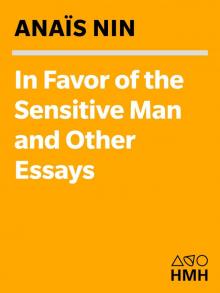 In Favor of the Sensitive Man and Other Essays (Original Harvest Book; Hb333)
In Favor of the Sensitive Man and Other Essays (Original Harvest Book; Hb333)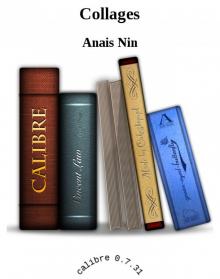 Collages
Collages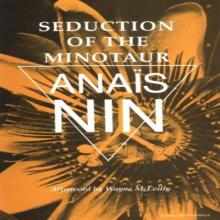 Seduction of the Minotaur
Seduction of the Minotaur Children of the Albatross
Children of the Albatross Delta of Venus
Delta of Venus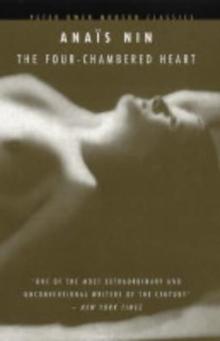 The Four-Chambered Heart coti-3
The Four-Chambered Heart coti-3 Diary of Anais Nin, Volume 2
Diary of Anais Nin, Volume 2 Diary of Anais Nin, Volume 1
Diary of Anais Nin, Volume 1 Diary of Anais Nin, Volume 4
Diary of Anais Nin, Volume 4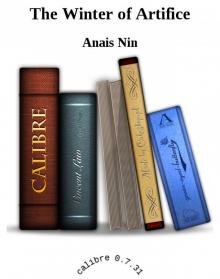 The Winter of Artifice
The Winter of Artifice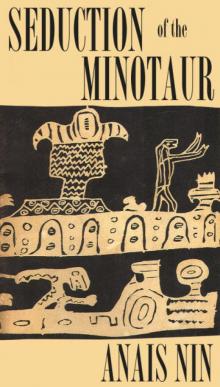 Seduction of the Minotaur coti-5
Seduction of the Minotaur coti-5 Children of the Albatross coti-2
Children of the Albatross coti-2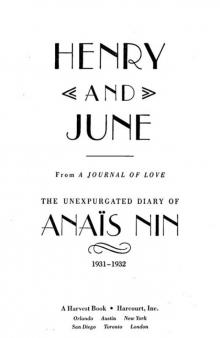 Henry and June: From A Journal of Love -The Unexpurgated Diary of Anaïs Nin (1931-1932)
Henry and June: From A Journal of Love -The Unexpurgated Diary of Anaïs Nin (1931-1932) Ladders to Fire
Ladders to Fire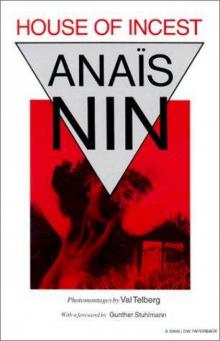 House of Incest
House of Incest